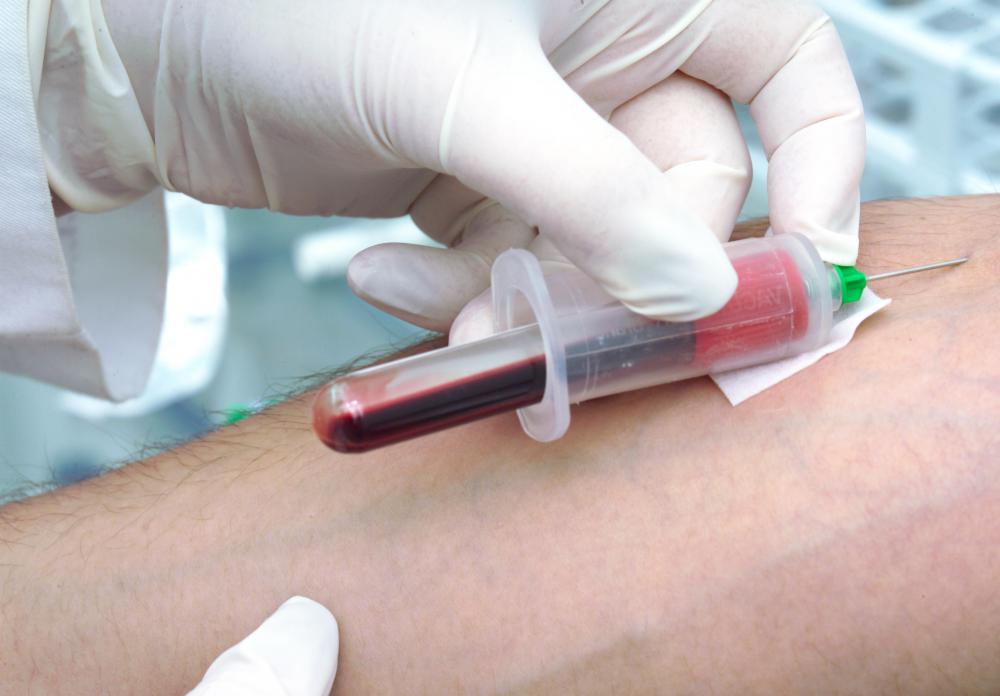At TheHealthBoard, we're committed to delivering accurate, trustworthy information. Our expert-authored content is rigorously fact-checked and sourced from credible authorities. Discover how we uphold the highest standards in providing you with reliable knowledge.
What is an Immunoglobulin?
Immunoglobulin is a type of protein that helps the body fight disease. Immunoglobulin, abbreviated at Ig, is also referred to as antibody. The substance is located in various parts of the body, depending on the type of immunoglobulin it is and its function. There are five different forms of the antibody, each with a particular job.
IgA is located in the respiratory and digestive tract, the nose, ears, eyes, and vagina. IgA is responsible for protecting the body from outside invaders. It is found in saliva, blood, and tears. IgG is the smallest form of immunoglobulin, and is located in all body fluids. It is responsible for fighting bacterial and viral infections, and is the only antibody that crosses the placenta to protect a fetus during pregnancy.

IgM is the largest antibody. It is the first responder to infection, and is located in the blood and lymph fluid. Along with mounting an initial response to foreign bodies, IgM also encourages other immune system cells to fight the infection. IgD is located in the tissues of the torso and chest, and researchers have not determined its function.
IgE is located in the various mucous membranes, in the skin, and the lungs. IgE is responsible for the body's reaction to allergens such as pollen, fungus, dander, and spores. It may also trigger allergic reactions when exposed to milk, medications, and poisons. People who suffer from allergies often have high levels of IgE.

Someone experiencing health problems may have their immunoglobulin levels tested. This is a simple blood test, and the results are typically available in a few days. It is possible for a healthcare provider to diagnose various conditions by testing antibody levels.
High levels of IgA may indicate multiple myeloma, chronic hepatitis, cirrhosis of the liver, or an autoimmune disorder such as rheumatoid arthritis. High levels of IgG are often a sign of a chronic, long-term infection, or multiple sclerosis. Elevated levels of IgM may signal mononucleosis, parasitic infection, or kidney damage. High levels of IgE indicate allergies or asthma.

Low levels of IgA or IgG may indicate leukemia or kidney damage. Low levels of IgM are often a sign of immune system problems, and low levels of IgE are often a sign of an inherited muscle condition that affects coordination. Immunoglobulin levels are very helpful when trying to pinpoint a health concern, but are not the only tests used to diagnose these conditions.
AS FEATURED ON:
AS FEATURED ON:


















Discussion Comments
@amysamp - I see your thinking, that you may need to replenish the IgA if it is high and therefore chronically fighting the infection therefore you might need new immunoglobulin antibodies to continue the fight.
However, I have only heard of IgG being administered intravenously. And this antibody is administered for Immune deficiencies, acquired compromised immunity conditions, autoimmune diseases, inflammatory diseases, and acute infections.
And if I remember correctly these diseases occur with low immunoglobulin counts so the immunoglobulin being administered via IV may be to increase the levels as opposed to replenish the levels.
How great are these immunoglobulin antibodies? (Except of course when you have the high levels of IgE and you feel affects from various allergies more than the folk with the average level of IgE.)
If you are suffering from cirrhosis of the liver or rheumatoid arthritis and therefore you have high levels of IgA, will you ever need to replace or get any more immunoglobulin via intravenously (more often said as receiving immunoglobulin via iv) or maybe have an immunoglobulin infusion?
Post your comments